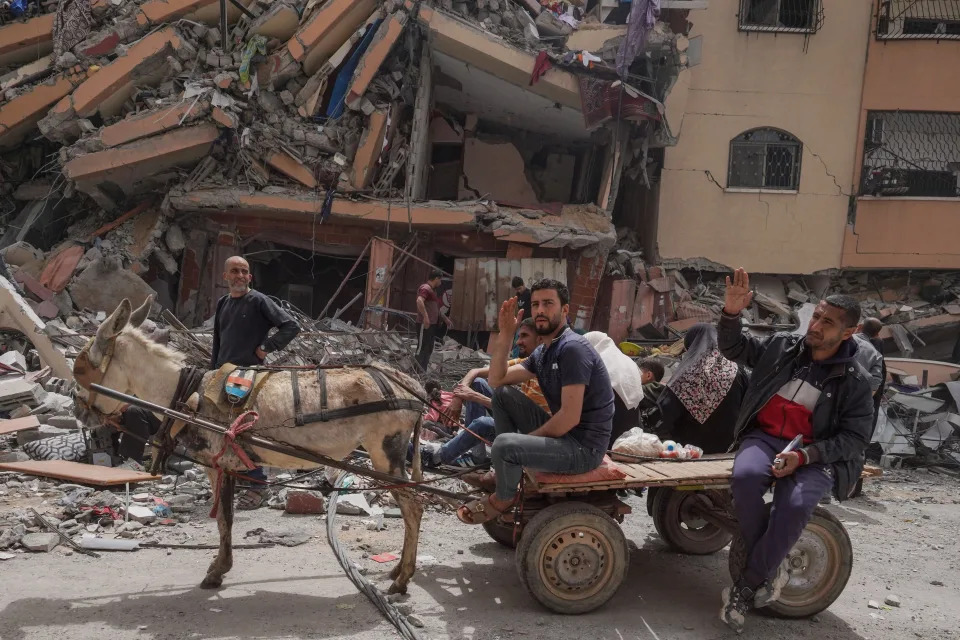Iran threatens to target Israeli nuke facilities; Middle East on 'precipice' of bigger war

The Middle East is on the "precipice" of a broader war that can be averted with a two-state solution allowing Israel and Palestine to exist side-by-side with Jerusalem as a shared capital, United Nations Secretary General Antonio Guterres told the Security Council on Thursday.
However, that solution won't come from immediate U.S. recognition of a Palestinian state after the U.S. vetoed in the Security Council a draft resolution to that effect Thursday.
Guterres' comments came as Tehran warned it has the ability to strike Israeli nuclear sites if Israel targets Iran's nuclear facilities.
Guterres said a two-state solution to the Israeli-Palestinian crisis is the basis of U.N. resolutions, international law and previous agreements. The current Israeli government, however, has shown little interest in relinquishing control of the occupied territories.
"One miscalculation, one miscommunication, one mistake, could lead to the unthinkable – a full-scale regional conflict that would be devastating for all involved and for the rest of the world," he said.
Guterres called on Israel as the "occupying power" to protect the Palestinian population in the West Bank against violence and intimidation and to allow safe passage for humanitarian aid into Gaza.
"Let me be clear − the risks are spiraling on many fronts," he said. "We have a shared responsibility to address those risks and pull the region back from the precipice."
Developments:
∎The European Council said new sanctions would be imposed on Iran’s drone and missile programs as punishment for the weekend’s attack on Israel.
∎ The U.S. and Israel were to hold a virtual meeting Thursday about Israeli's planned military operation in Rafah, Reuters reported, citing a U.S. official it did not name. The U.S. and most of the world has been urging Israel to drop plans for an invasion of the southern Gaza city that has been overwhelmed by Palestinians fleeing fighting elsewhere in the enclave.
∎ Two-thirds of Gaza residences have been destroyed or damaged since the war began in October, UNICEF reported.
∎ A special State Department panel recommended months ago that Secretary of State Antony Blinken disqualify multiple Israeli military and police units from receiving U.S. aid after reviewing allegations of serious human rights abuses. ProPublica reported. Blinken has thus far not acted on the recommendations.

US says Palestinian statehood from come from deal with Israel, not UN vote
The U.S. veto of a draft resolution to grant Palestinians membership in the U.N. does not mean the Biden administration opposes their statehood, but rather that this is not the way to attain it, a senior American official said after the Security Council vote Thursday.
“The United States continues to strongly support a two-state solution,'' Deputy U.S. Ambassador to the U.N. Robert Wood told the council. "This vote does not reflect opposition to Palestinian statehood, but instead is an acknowledgment that it will only come from direct negotiations between the parties.”
The administration has been pushing for a reformed Palestinian Authority to take over governing Gaza after the war and for Israel to agree to a path for future Palestinian statehood, which the government of Prime Minister Benjamin Netanyahu fiercely opposes.
Nonetheless, PA President Mahmoud Abbas was livid over the American vote, the only one cast in the Security Council against a measure to recommend to the U.N. General Assembly that “the State of Palestine be admitted to membership.” Britain and Switzerland abstained, and the other 12 nations voted in favor.
Abbas called the U.S. decision “unfair, unethical, and unjustified,” saying in a statement that it challenged “the will of the international community, which strongly supports Palestine’s full membership.”
Iran says it could strike Israeli nuclear sites
Iran could alter its peaceful “nuclear doctrine” and if Israel targets Iranian nuclear sites "we will surely and categorically reciprocate with advanced missiles against their own nuclear sites," a senior commander in Iran’s Islamic Revolutionary Guard Corps said Thursday. Israeli Prime Minister Benjamin Netanyahu says Israel is considering retaliating against Tehran for its weekend missile and drone attack.
Tehran has repeatedly claimed its nuclear program is for civilian purposes. Israel has accused Iran of attempting to obtain nuclear strike capability and has long pledged not to allow that to happen.
“The threats of the Zionist regime (Israel) against Iran's nuclear facilities make it possible to review our nuclear doctrine and deviate from our previous considerations," Ahmad Haghtalab, the IRGC commander in charge of nuclear security, told Iran's semi-official Tasnim news agency.
Tehran's retaliatory attack came less than two weeks after an airstrike linked to Israel destroyed Iran's consulate in Damascus, killing several high-ranking Iranian military officers.
Over 100 arrested at Columbia University antiwar protest
New York City police arrested over 100 people Thursday after Columbia University students set up encampments to protest Israel’s war in Gaza.
Video showed NYPD forcibly moving students out of tents at the center of Columbia’s campus in Manhattan. University President Minouche Shafik told police the encampments began early Wednesday morning with more than 100 people occupying the South Lawn of the campus.
New York City Mayor Eric Adams confirmed the NYPD made more than 108 arrests.
Demonstrators were warned multiple times that they were not allowed to occupy the space and needed to disperse, Shafik said. All those participating were told they were trespassing and have been suspended, she said.
On Wednesday, Shafik appeared before a congressional hearing in Washington, D.C., regarding antisemitism on campus. She defended free speech, but when asked whether calling for the genocide of Jewish people would violate Columbia’s rules, she said yes.
− Eduardo Cuevas
Qatar backing away from mediator role
Criticism in the U.S. Congress helped fuel Qatar’s decision to announce a re-evaluation of its role as mediator in hostage negotiations between Israel and Hamas, a senior Arab official tod The Times of Israel. The majority of Qatar’s frustration is directed at the Israeli government, which has led much of the criticism against Doha, the official said. But he added that recent remarks from Congress members also played a role in the decision.
Democratic Rep. Steny Hoyer of Maryland called for the US to re-evaluate its ties to Qatar if Doha fails to pressure Hamas in the negotiations, and a group of Republican lawmakers submitted legislation aimed at stripping Doha of its coveted status as a major non-NATO ally.
US announces Iran sanctions after 'unprecedented' attack on Israel
The Treasury Department announced sanctions Thursday for 16 people and multiple companies linked to production of drones used in Iran's "unprecedented" weekend attack on Israeli territory. The sanctions target the Iranian drone program and steel and auto industries accused of working on behalf of Iran’s Islamic Revolutionary Guard Corps.
The department statement notes that Iran’s metals sector generates several billion dollars in revenue annually, mostly from steel exports. The sanctions were coordinated with Britain and in consultation with "partners and allies," the statement said.
"We’re using Treasury’s economic tools to degrade and disrupt key aspects of Iran’s malign activity, including its UAV program and the revenue the regime generates to support its terrorism,” Treasury Secretary Janet Yellen said. “We will continue to deploy our sanctions authority to counter Iran with further actions in the days and weeks ahead."
Iran says US was told it would not be targeted
Tehran, before launching retaliatory strikes at Israeli targets last weekend, notified U.S. officials that American military bases and interests in the region would not be targeted unless Washington aided in Israeli attacks on Iranian interests, a top Iranian official said Thursday. White House national security spokesperson John Kirby has said the United States did exchange messages with Iran but has dismissed as "ridiculous" claims that U.S. officials were informed of Iran's timeframe or targets.
Iranian Foreign Minister Hossein Amirabdollahian told the Islamic Republican News Agency the messages were exchanged through the Swiss Embassy, which represents U.S. interests in Iran to prevent the escalation of tensions. Iran had exercised restraint "considering the regional conditions" but repeatedly asked the U.N. secretary-general and Security Council to fulfill their duties and confront Israel's actions. Tehran then decided to initiate the strikes on Israeli targets.
Israel said 99% of the approximately 350 "suicide drones, cruise missiles, ballistic missiles, and rockets" launched from Iran, Iraq, Yemen and Hezbollah in Lebanon were intercepted.
- Questions and Answers
- Opinion
- Story/Motivational/Inspiring
- Technology
- Art
- Causes
- Crafts
- Dance
- Drinks
- Film/Movie
- Fitness
- Food
- Games
- Gardening
- Health
- Home
- Literature
- Music
- Networking
- Other
- Party
- Religion
- Shopping
- Sports
- Theater
- Wellness
- News
- Culture
- War machines and policy

